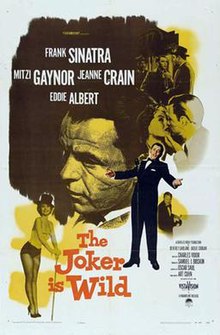The Joker Is Wild
| The Joker Is Wild | |
|---|---|

Theatrical release poster
|
|
| Directed by | Charles Vidor |
| Produced by | Samuel J. Briskin |
| Screenplay by | Oscar Saul |
| Based on |
Life of Joe E. Lewis by Art Cohn |
| Starring | |
| Music by | Walter Scharf |
| Cinematography | Daniel L. Fapp |
| Edited by | Everett Douglas |
|
Production
company |
|
| Distributed by | Paramount Pictures |
|
Release date
|
|
|
Running time
|
126 minutes |
| Country | United States |
| Language | English |
| Box office | $3 million (USA) |
The Joker Is Wild is a 1957 American musical drama film directed by Charles Vidor, starring Frank Sinatra, Mitzi Gaynor, Jeanne Crain, and Eddie Albert, and released by Paramount Pictures. The film is about Joe E. Lewis, the popular singer and comedian who was a major attraction in nightclubs from the 1920s to the early 1950s.
Joe E. Lewis (Frank Sinatra), a successful 1920s Chicago night-club entertainer is invited to work for the Mob during the Prohibition era. His eventual decision to work elsewhere results in his face being slashed and his throat cut, preventing him from continuing with his current act as a singer.
Lewis soon develops an acerbic and witty sense of humor and is given a break as a stand-up comedian from singer Sophie Tucker (playing herself). Soon, Lewis makes a career for himself, but heavy drinking and a self-destructive streak leads him to question his way of living and what his life has become.
Sinatra read Art Cohn's book The Joker Is Wild: The Story of Joe E. Lewis during the mid-'50s, was immediately taken by the story, and bought the rights to the book after Lewis himself turned down a reported $150,000 from Metro-Goldwyn-Mayer for the film rights to his story. Variety reported in November 1955 that Paramount Pictures would finance what was, for all intents and purposes, an independent feature film which was headed by Lewis and Sinatra along with director Charles Vidor and author Art Cohn. Each of the four partners were paid a reported $400,000, along with 75% of the film's net profits. The New York Times would report that Sinatra's share was in the region of $125,000 along with 25% of the film's profits.
...
Wikipedia
